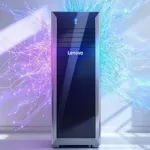Is Microsoft the best positioned vendor in the tablet market? Well, given that Redmond has zero market share, promoting such a prediction would be fairly controversial for any analyst.
Yet, Morgan Stanley did just that, and fellow Microsoft watcher Mary Jo Foley picked up the rather optimistic projection in her column yesterday, which also forecasts the rise of Microsoft and Samsung, along with the fall or decline of pretty much everyone else connected to the traditional PC ecosystem.

Oh, and yes, Apple is seen dropping below 50% market share.
Report Results and Comments
In addition, the study concludes tablet growth is near vertical (growth rates much higher than smartphones or e-readers) and that buyers are price sensitive. The latter snippet suggests Apple’s lock on the market is no more absolute than it was with the iPhone or early PC. And the outcome, according to Morgan Stanley, is that Windows 8 will sweep by Android to take second place – while Cupertino drops to under 50% market share.
Some other tablet-related comments from the analysts? Amazon’s Kindle Fire hasn’t been doing well outside of the holiday shopping season. As such, they doubt the tablet’s long term success, as people may simply be buying and receiving the Kindle as gifts.
Of course, it should be noted that Morgan Stanley is an investment house, which means their reports are typically used to project long-term stock scenarios. Interestingly enough, Morgan Stanley seem to be promoting Samsung as the biggest hardware beneficiary (they get a pop for both their ARM parts and tablets in general) and Microsoft as the largest software beneficiary.
The report’s section on pricing is also intriguing, because it positions Apple as the gold standard – effectively prompting all other vendors to price their respective devices well under the iPad to ensure any measure of success. Essentially, Microsoft must be 6% cheaper for consideration, while Android weighs in at approximately 9%. These would be upper limits, as the 3% variance in price between Microsoft and Android likely isn’t enough to absorb the difference in the cost of both platforms to the OEMs.
Killer App “Microsoft Office”
The major foundation for the supposed win? An unreleased embedded version of Microsoft Office for Windows (ARM) RT. This RISC-friendly version of Windows 8 is believed to be the dominant platform for tablets – and the report doesn’t appear to even consider the x86 version of this platform as a viable option for tablet buyers.
As you may recall, Office as the “killer app” has been well tested historically in the market. The software suite is largely the reason why the PC market is dominated by Windows, with Mac OS X weighing in as a distant second choice. Remember, Office started out as the product that (initially) allowed Microsoft to sell broadly and became the key driver for DOS and Windows – ultimately achieving and maintaining dominance.
Currently, with regard to productivity, all tablets are somewhat lacking, but finding a decent productivity package has been especially difficult on Google’s mobile Android platform, and that is clearly why Mountain View decided to snap up Quickoffice. Personally, I think Google should have acquired Coral instead, as the latter company boasts a much higher general compatibility with Office, which is likely a key aspect of Mountain View’s competitive strategy.
Wrapping Up: The Future Has Not Been Written
Excuse me from borrowing from the Terminator franchise but the above-mentioned phrase seems somewhat appropriate here. Remember, survey-based reports are often highly unreliable. This is because
interviewees are talking about a future event, meaning, not a single person is capable of reliably determining future attitudes or choices. Obviously, Apple and Google will improve their offerings (they clearly didn’t know about Quickoffice) and not one of the participants had likely seen a Windows RT tablet or an accompanying price point.
Indeed, the future of the tablet market is somewhat uncertain, as global economic conditions remain quite fluid. Should Greece or Spain collapse, tablets will be perceived luxury items and folks might not buy them if they see their retirement funds and savings evaporate into the swirling ether.
Frankly, there are simply too many variables right now surrounding tablets (even down to what Office on Windows RT actually means) to cast a reliable forecast of what will happen once Windows RT launches. An accurate projection would require actually seeing the tablet, reviewing marketing initiatives, and conducting a thorough competitive analysis.
Personally, I believe that if Microsoft executes at level consistent with the way they were in the late 80s or early 90s Redmond could take significant tablet share, particularly if Google continues to underfund its efforts and a post-Steve Jobs Apple fails to step up to the plate. While all of this is possible, it is still too early to say whether or not it is also likely. Finally, I actually think Smart Glass, or something like it could equally decide the tablet space. It will definitely be interesting to see how this year plays out.






